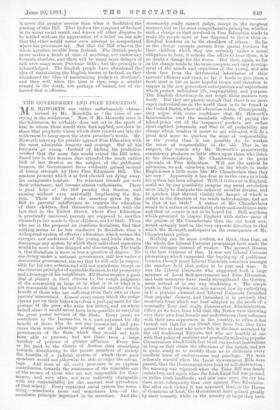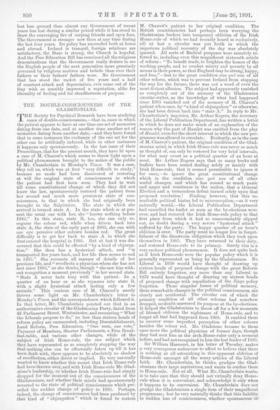THE GOVERNMENT AND FREE EDUCATION.
R. HOWORTH was rather unfortunately charac- terised by Mr. Mundella as "the voice of one crying in the wilderness." Now, if Mr. Howorth cries in the wilderness, he certainly does not cry in the spirit of him to whom these words were first applied, nor does he share that prophetic vision which drew crowds out into the wilderness to bang upon the stern preacher's words. Mr. Howorth takes up his parable against Free Education with the most admirable tenacity and courage. But all his forecasts go wrong. Instead of finding his prediction verified that the same fate would attend the Bill intro- duced late in this Session that attended the much earlier Bill of last Session on the subject of the publicans' licences, the Government have evidently gained instead of losing strength by their Free Education Bill. The resolute protests which it at first elicited are dying away. Its antagonists hesitate. Its reluctant friends get over their reluctance, and become almost enthusiastic. There is good hope of the Bill passing this Session, and passing without even materially lengthening the Ses- sion. Those who dread the sanction given by the Bill to parental indifference as regards the education of their children, find themselves confronted with the fact that in the United States, where Free Education is practically universal, parents are supposed to sacrifice themselves too much to their children, not too little. Those who see in the proposal an insidious Socialism, find that nothing seems to be less conducive to Socialism than a widespread system of effective education, which rouses the energies and ambitions of the young, and leads them to discourage any system by which their individual capacities would be more or less damped and discouraged. The truth is, that Socialism is more or less a question of degree. No one living under a national government, still less under a democratic government, can say that he will only be respon- sible for his own actions, and will not contribute, except on the strictest principles of equitable division, to the prosperity and advantage of his neighbours. All States require a good deal of pliancy in their citizens to the rough judgment of the community at large as to what it is or what it is not reasonable that the well-to-do should sacrifice for the benefit of those who are suffering from their own or their parents' misconduct. Almost every stamp which the richer classes put on their letters involves a part-payment for the postage of the poor, who write few letters, and on whose behalf alone it would never have been possible to establish the great postal services of the State. Every penny we contribute to the Income-tax is a, part-payment for the benefit of those who do not pay income-tax, and pro- cures them some advantage arising out of the orderly government of the State which they would not have been able to procure, had not there been a large number of persons of greater affluence. Every fine or fee paid to the Courts of Justice does something towards distributing to the poorer members of society the benefits of a judicial system of which ,these poor members would not otherwise be able to enjoy the advan- tage. And most of all, every poor-rate is an express contribution towards the sustenance of the miserable out of the means of those who are not responsible for their misery, and very often not even indirectly chargeable with any responsibility for the amount and prevalence of that misery. Every organised social system has some- thing,—sometimes more and sometimes less,—of the socialistic principle ingrained in its structure. And the community really cannot judge, except in the roughest manner, and on the most comprehensive principles, whether such a change as that involved in Free Education tends to make the people more or less disposed to throw their in- dividual burdens on to the shoulders of others. So far as the change exempts parents from special burdens for their children which they are certainly under a moral obligation to bear, if nobody else offers to bear them, it is no doubt a change for the worse. But then, again, so far as the change tends to the more complete and easy develop- ment of the minds and capacities of the young, and sets them free from the detrimental inheritance of their parents' idleness and vices, so far it tends to give them a fresh start in life on more hopeful terms, and therefore to inspire in the new generation anticipations and aspirations which protect individual life, responsibility, and purpose. The English democracy do not weigh these matters very finely. But they see plainly enough that there is no more eager individualism in the world than is to be found in the United States, where all education is free. Consequently, they argue with some confidence that Mr. Howorth's lamentations over the socialistic effects of paying the school-pence out of the taxpayers' pockets are rather short-sighted jeremiads, and that in all probability any change which renders it easier to get educated, will do a great deal more to quicken the sense of responsibility in the young than it can possibly do to weaken the sense of responsibility in the old. That is, we suspect, the reason why Mr. Howorth's praiseworthy consistency produces so little effect upon those who listen to his denunciations. Mr. Chamberlain is the great advocate of Free Education. Will not the system he advocates, we ask ourselves, tend, on the whole, to make Englishmen a little more like Mr. Chamberlain than they are now ? Apparently it has done so in the cases in which his system has been adopted. Well, if it does so in England, could we by any possibility imagine any social revolution more likely to dissipate the indolent socialist dreams, and to quicken that shrewd vitality the danger of which is rather in the direction of too much individualism, and not in that of too little ? A nation of Mr. Chamberlains would be a, nation of remarkably clever and ambitious men, and that of course is not to be hoped for. Still, anything which promised to inspire England with rather more of the genius of Mr. Chamberlain than she can boast now, would certainly tend in the very opposite direction to that which Mr. Howorth anticipates as the consequence of Mr. Chamberlain's policy.
Nothing can be more evident, we think, than that, on the whole, the Liberal Unionist promptings have made the Tories stronger instead of weaker. The present Session is the best evidence of this. It was not Liberal Unionist promptings which suggested the buying-up of publicans' licences, though many Liberal Unionists, ourselves amongst the number, held that policy to be just and wise. It was the Liberal Unionists who suggested both a large measure of Local Self-government and Free Education, and both measures have vastly strengthened the Govern- ment instead of in any way weakening it. The simple truth is, that Toryisna can only succeed now by embodying in it a popular element, and Liberal Unionists furnished that popular element, and furnished it in precisely that moderate form which was best adapted to the needs of a nominally Tory and really Conservative Administration. Often as we have been told that the Tories were throwing over their own best friends and undermining their influence with their own supporters in the country, so often it has turned out that for one friend they have lost, they have gained two at least who never felt in the least attracted by the old traditional Toryism, but who are heartily at one with that policy of cautious and gradually widening popular Conservatism which holds fast to all our ancient institutions so long as they retain the affections of the nation, and yet is quite ready so to modify them as to obliterate every needless trace of exclusiveness and privilege. We were solemnly warned when the Local Government Bills were passed, that the Government were bent on self-destruction ; the warning was repeated when the Tithe Bill was firmly insisted on, and again when the Irish Land Bill was pressed on sullen Irish landlords ; and now once more the cry has risen more vehemently than over against Free Education. But after each victory it has appeared that, in the House of Commons at least, the Government have gained greatly by their tenacity, while in the country at large they have lost less ground than almost any Government of recent years has lost during a similar period while it has stood to draw the converging fire of carping friends and open foes. The Government is stronger now than at any time during the last four years. Its policy has succeeded both at home and abroad. Ireland is tranquil, foreign relations are satisfactory, the State is strong, the Church is hopeful. And the Free Education Bill has convinced all the religious denominations that the Government really desires to see the English people of the next generation more genuinely governed by religious motives and beliefs than ever their fathers or their fathers' fathers were. No Government that has stood the racket of five years and a half of constant attack and depreciation, ever came out of the fray with so sensibly improved a reputation, alike for liberality of feeling and for steadfastness of purpose.



































 Previous page
Previous page